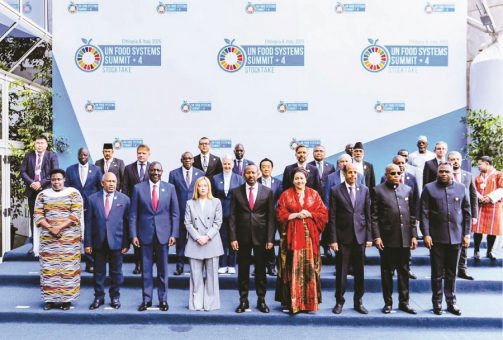Nigeria and several other African nations have made a strong call for urgent global cooperation to tackle food insecurity and address the climate-related challenges threatening agriculture across the continent.
This united front was presented during the opening session of the United Nations Food Systems Summit Stocktake (UNFSS+4), held in Addis Ababa, Ethiopia, where world leaders gathered to assess progress on food system reforms since the inaugural summit.
Speaking at the high-level session, Nigeria’s Vice President, Kashim Shettima, outlined Nigeria’s strategic efforts to boost food production and combat hunger.
According to a statement issued in Abuja by Stanley Nkwocha, Senior Special Assistant to the President on Media and Communications (Office of the Vice President), Nigeria is leveraging modern tools including Artificial Intelligence (AI), geospatial analytics, and satellite-driven climate intelligence.
“We are deploying these tools to monitor production, enhance transparency, connect producers to markets, and reduce waste across the value chain,” Shettima said.
He emphasized that food insecurity is now a global crisis, urging nations to embrace bold and inclusive solutions that respect human dignity. “A broken food system in any part of the world diminishes the dignity of humanity as a whole. Let us rise with a shared purpose. Let us build a world where no child sleeps on an empty stomach, where no farmer is forgotten, and where food is not a luxury but a human right,” he stated.
Shettima also reaffirmed Nigeria’s commitment to agro-industrialisation and inclusive growth, highlighting the National Food Systems Transformation Pathway and the Presidential Initiative on Food Security. These initiatives focus on cultivating key staples such as maize, rice, cassava, and wheat through climate-smart practices and targeted support for smallholder farmers, especially women and youth.
“We are backing this with climate-smart innovations, financial inclusion, and expanded extension services. This is not just policy. It is action,” he added.
Ethiopian Prime Minister, Dr. Abiy Ahmed, in his address, described the summit as a moment for renewed commitment to transforming food systems. He stressed the need for predictable concessional financing to support agriculture, rural development, and infrastructure. “Climate finance must be aligned with food systems,” Abiy said.
In a pre-recorded message, United Nations Secretary-General António Guterres said the summit was a call to action, noting that food systems are closely linked to the climate crisis, global justice, and equity.
“Global hunger is rising. This is not just a crisis of scarcity but one of justice and climate. Climate change is destroying harvests, disrupting supply chains, and worsening humanitarian crises,” Guterres warned.
Leaders such as Italian Prime Minister Giorgia Meloni and Kenyan President William Ruto also stressed the importance of political will, sustained investment, and international solidarity in overhauling global food systems.
The summit ends with a growing consensus: for the world to end hunger and protect the planet, countries must work together to build climate-resilient and inclusive food systems that leave no one behind.










